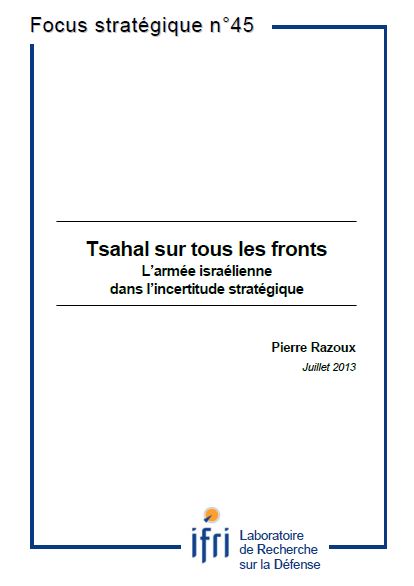Tsahal sur tous les fronts : L'armée israélienne dans l'incertitude stratégique

Facing threats on all its borders, as well as social, economic and religious tensions, the Israeli Defense Forces (IDF) is now under significant pressure for ensuring its core mission: the survival of the State of Israel.
While the post-Arab Spring Middle East appears to be cursed with persistent political instability, endemic violence and terrorism, the IDF now attempts to keep a full-spectrum capability, fitted to adapt to any situation, simultaneously if needed. To this end, the IDF envisions both defensive (territorial fence, deterrence, antimissile defense) and offensive (long range strikes and special operations forces raids) strategies. In order to keep up with such an ambitious agenda, the IDF needs to keep on upgrading its different services (land forces, air forces, navy, and, increasingly, cyber) in a sustainable way for both its economy and society.
This paper is published in French only – Tsahal sur tous les fronts : L'armée israélienne dans l'incertitude stratégique
Related centers and programs
Discover our other research centers and programsFind out more
Discover all our analysesThe Franco-German Brigade and the Revival of European Defense
One thing has been clear since Donald Trump's return to the White House: the very existence of the European unification project is threatened. Unless it develops a sovereign defense policy to counter the war in Ukraine and the weakening of American security guarantees, the European Union will continue to see its internal cohesion and external attractiveness wane.
Taking the Pulse: Can Europeans Build Their Independent Extended Nuclear Deterrent?
Confronted with a U.S. disengagement and the Russian threat, Europeans are reconsidering their stance on nuclear deterrence. Given the capabilities of the French and British arsenals, can Europe develop an independent nuclear deterrent?

RAMSES 2024. A World to Be Remade
For its 42nd edition, RAMSES 2024 identifies three major challenges for 2024.
A Transatlantic Defense Industrial Base? Two Contrasting Views
The evolving landscape of global defense cooperation has brought the transatlantic relationship between the United States (US) and Europe into sharp focus. As geopolitical tensions rise and the threat environment becomes more complex, the question of how Europe can best ensure its security while navigating its relationship with the United States has become paramount. This double feature report offers two contrasting views on the dynamics of US-Europe defense industrial relations, highlighting the challenges and opportunities that lie ahead for both parties.








